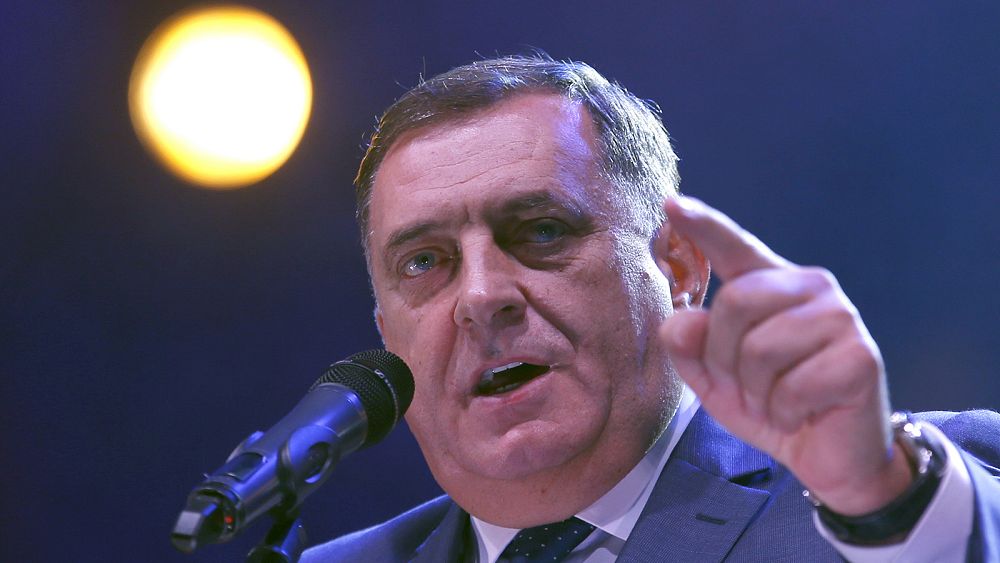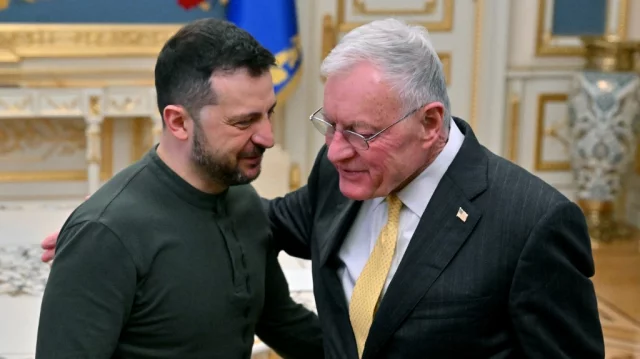
The Bosnian Serb entity assembly voted yes on a set of provisions that would see the regional government opt-out of national institutions despite the threat of new sanctions.
The all-day session was marked by the long speeches of the Bosnian Serb member of the threeway state-level presidency Milorad Dodik and the entity of the Republika Srpska president Željka Cvijanović, while a heated argument led to the opposition leaving the proceedings in protest.
Despite this, the ruling coalition led by Dodik’s SNSD had enough votes to approve the proposals that included drafting new entity-level laws that would allow the Bosnian Serb region to withdraw from the Bosnian army, security services, tax system, and judiciary.
The proposed measures come with a six-month period needed to draft new laws, including changes to the entity’s constitution.
Dodik has previously made repeated threats to secede what amounts to almost half of the country.
In his speech during the session, he quoted the former British conservative prime minister David Cameron, comparing himself to Cameron ahead of the Brexit vote.
But opposition leaders in the entity assembly heavily criticised Dodik’s policies, with mutual accusations leading to bouts of shouting and interruptions to the prolonged session.
One of the leaders of the opposition, SDS’ Mirko Šarović said that the initiative is “a direct threat to peace,” which would “lead the RS into the spiral of war.”
“As a party, we’ll support any reasonable proposal, but that has to happen by agreement. It is our responsibility and our duty to tell the people what we are leading them into,” Šarović concluded.
MP Branislav Borenović, the leader of another opposition party, PDP, said that it was “hypocritical” of Dodik to do this in the run-up to the general elections, set for October 2022.
Borenović, who took part in the 1992-1995 war in the country as a soldier of the Army of the Republika Srpska, said that he knows what having separate armies would represent for Bosnia’s future.
“It means conflict, war, and death,” he exclaimed.
“Tell us about your projections, Mr Dodik: what does the RS army represent? Do we have money for tanks, airplanes? The conditions to put up checkpoints at the entity line? Give your answers to the citizens,” Borenović insisted.
International community asked to react
Other officials in the country, including the Bosniak and Croat members of the presidency, Šefik Džaferović and Željko Komšić, have called on the US and the European Union to crack down on Dodik and his associates.
The international community reacted after the session, with representatives of Western governments expressing concern over the move which could potentially weaken Bosnia’s central authority.
A system of checks and balances, however, will most likely see the proposed laws rejected, either by the upper house of the entity parliament or the state Constitutional Court.
The US has already imposed a travel ban and assets freeze on Dodik, while both American and German officials have recently threatened more sanctions if Bosnian Serbs further weaken Bosnia’s central institutions.
The move, if pushed for unilaterally, would go against the peace agreement that set up the current political system in the country, thought to be among the most complicated in the world.
Drafted to bring the Bosnian war to an end in 1995, the US-sponsored Dayton Peace Accord created two administrative units in the country — the Republika Srpska and the Bosniak-Croat majority Federation of BiH.
The two regions were given some autonomy, with an umbrella state-level government overseeing the country’s main institutions, including the army, the top judiciary, and tax administration.
The Bosnian Serb leader has recently intensified his decade-long separatist campaign, pledging in September to create the Republika Srpska’s own army, tax authority, and judiciary.
The US has sent several diplomats to Bosnia in recent weeks to reiterate its support for the country’s territorial integrity and central institutions.
Dodik has repeatedly said he doesn’t care about new sanctions, adding that this would bring Serbs even closer to their “true friends” — a reference to his close ties to Russia and Vladimir Putin.
He has also denied that the withdrawal from the central institutions would lead to a quick secession or a new war, stating that “the Republika Srpska would not defend itself even if attacked.”
The 1992-1995 war was the worst bloodshed seen in Europe since World War II, with more than 100,000 casualties, while also leaving millions as refugees or internally displaced.









